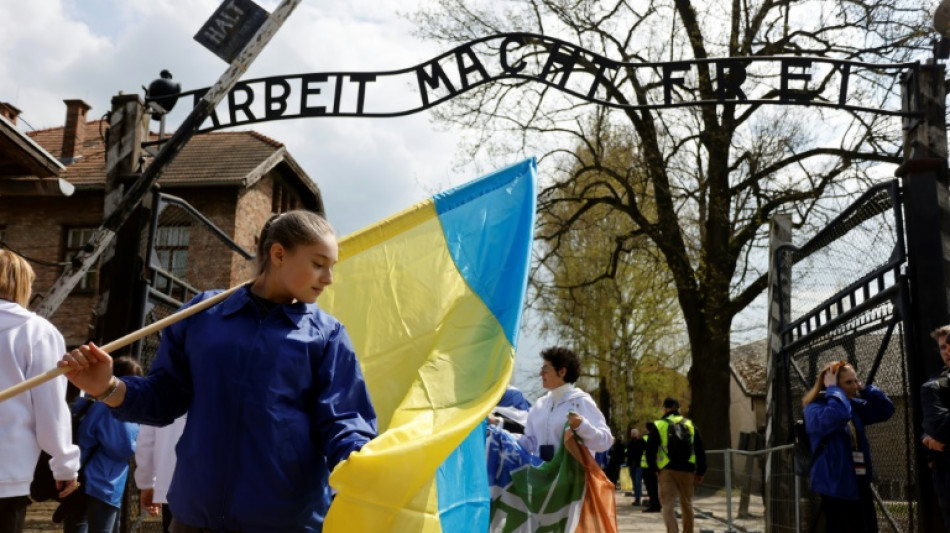

Thoughts of Ukraine at Auschwitz March of the Living
As Ukrainian refugee Olga marched Thursday alongside Holocaust survivors to honour the victims of the Auschwitz-Birkenau death camp, her war-torn homeland was on her mind.
"What happened years ago and what we'd like to forget, it's happening today in Ukraine," she told AFP, fearing that history was repeating itself.
Having fled her western city of Vinnytsia after Russia's invasion of Ukraine, the 30-something found refuge in Oswiecim, Poland.
There she joined this year's edition of the March of the Living, the first since the pandemic struck.
Three thousand people from various countries, mainly Israel, walked from the notorious "Arbeit Macht Frei" (Work Will Set You Free) gate at Auschwitz to Birkenau, the main extermination site.
Nazi Germany built the death camp after occupying Poland during World War II.
One million European Jews died at the site between 1940 and 1945 along with around 80,000 non-Jewish Poles, 25,000 Roma and 20,000 Soviet soldiers.
The camp was liberated by the Red Army in January 1945.
- Lessons of the Holocaust -
Anna, another refugee, joined the march with her four-year-old son Mischa, who proudly waved a large blue-and-yellow Ukrainian flag.
"We're not Jewish but we came here to pay tribute to the victims of the Holocaust," she told AFP.
"We wouldn't like for history to repeat itself with Ukraine."
Agnes Kaposi, one of eight Holocaust survivors in attendance, called the war in Ukraine "desperately sad".
"It brings back memories that I didn't even remember I had... I suddenly think back on the things that happened to me and to those that I loved. It's terrible," the 89-year-old told AFP.
"I find it desperately sad that people have not learned the lessons of the Holocaust."
- 'No to hatred' -
Polish President Andrzej Duda also took part in the event, walking at the front.
"While this march is always accompanied by reflection and mourning, it is nonetheless an event symbolising life, the victory of life," he said in a speech.
"We are here to show that every nation has a sacred right to life," he added.
"We are saying loud and clear: no to hatred, no to anti-Semitism, no to anti-Ukrainianism, no to anti-Polonism, no to hatred."
At the tracks leading to the gas chambers, Galit Hamam placed a small wooden panel inscribed with the names of relatives killed in the Holocaust.
"It's awful that humans can do that to other humans... The atrocities that are happening. They shouldn't be happening," she told AFP.
"I think we all need to remember that and let people know what's happened here, what's happened there" in Ukraine, the 20-year-old added.
A resident of the British city of Leeds, she attended this year's March of the Living with her grandfather, Arek Hersh.
For Hersh, a 93-year-old Auschwitz survivor, the war in Ukraine cannot compare with the Holocaust.
"Not with the concentration camp. Nothing can compare with that," he told AFP.
W.Janssens--RTC



